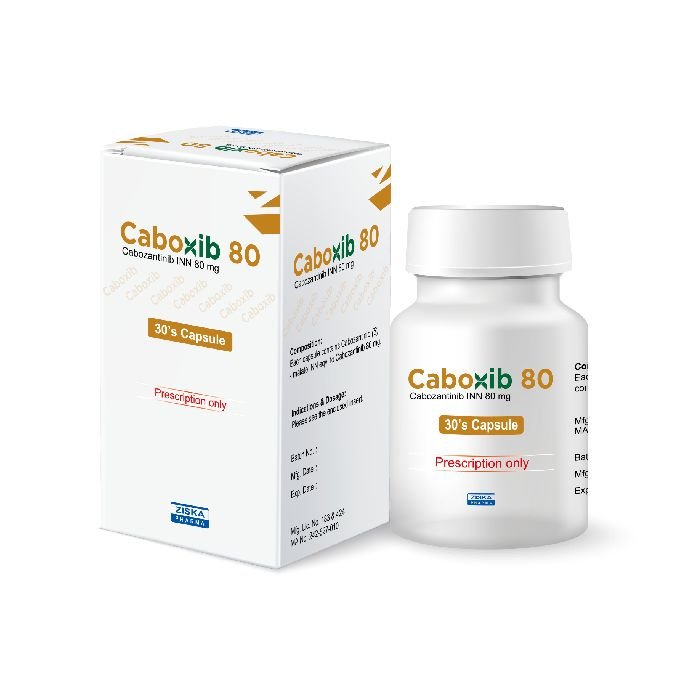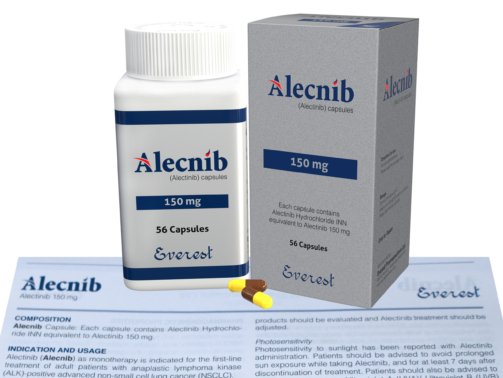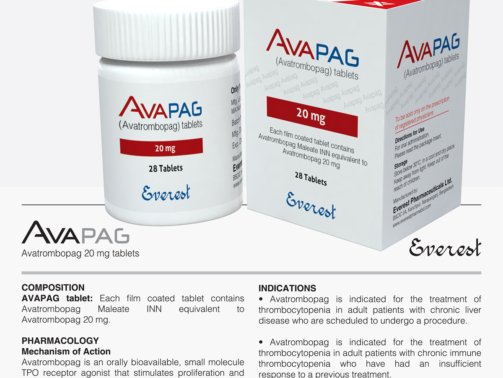Cabozantinib 80 mg (Cometriq)
0.00$
Caboxib (Cabozantinib) 80 mg is a medication used in the treatment of several types of cancer, particularly advanced renal cell carcinoma (RCC), hepatocellular carcinoma (HCC), and metastatic medullary thyroid cancer (MTC). It belongs to a class of drugs known as tyrosine kinase inhibitors, which work by blocking the activity of specific enzymes involved in tumor growth and angiogenesis. Caboxib 80 mg offers a targeted approach to cancer therapy, providing patients with a promising treatment option to help manage their disease.
Cabozantinib is a strong tyrosine kinase inhibitor (TKI) that is mainly used to treat a number of cancers, such as medullary thyroid cancer (MTC), hepatocellular carcinoma (HCC), and renal cell carcinoma (RCC). Patients who need a potent therapeutic impact are usually administered the 80 mg formulation, which is a higher-strength dosage.
Pharmacological Profile
Cabozantinib works by blocking several tyrosine kinases, especially AXL, VEGFR, and MET. Angiogenesis, metastasis, tumor development, and treatment resistance are all significantly influenced by these kinases. Cabozantinib efficiently slows tumor growth and improves patient survival rates by focusing on these pathways.
Indications
Cabozantinib 80 mg is commonly prescribed for:
Treatment options for advanced renal cell carcinoma (RCC) include first-line and second-line options.
Hepatocellular Carcinoma (HCC): Usually given when sorafenib treatment has failed.
Approved for cases of progressive or metastatic medullary thyroid cancer (MTC).
Dosage and Administration
Standard Dosage: Adult patients should begin taking 60 mg of cabozantinib orally once daily. However, depending on patient tolerance, clinical judgment, and certain treatment plans, 80 mg might occasionally be recommended.
Administration: It should be taken at least one hour before or two hours after a meal, on an empty stomach.
Adjustments: In the event of side effects, hepatic impairment, or drug interactions, dose adjustments can be necessary.
Pharmacokinetics
Absorption: Two to five hours after treatment is usually when peak plasma concentrations are reached.
The CYP3A4 enzyme is primarily responsible for metabolism.
Elimination: Mainly expelled as urine (~27%) and feces (~54%). Because of its roughly 99-hour half-life, it can be taken once daily.
Mechanism of Action
Cabozantinib inhibits many receptor tyrosine kinases, which are necessary for the survival and growth of cancer cells. It inhibits angiogenesis by inhibiting VEGFR-2, which lowers the blood flow to tumors. MET inhibition is a very powerful tool in cancer treatment since it simultaneously inhibits the invasiveness and metastasis of tumor cells.
Potential Side Effects
Despite its effectiveness, cabozantinib has a number of negative effects, such as:
Typical symptoms include exhaustion, diarrhea, nausea, vomiting, appetite loss, and weight loss.
Serious: hepatotoxicity, hand-foot syndrome, gastrointestinal perforation, hemorrhagic events, and hypertension.
Interstitial lung disease, thromboembolism, and jaw osteonecrosis are uncommon yet severe conditions.
Drug Interactions
Cabozantinib interacts with various drugs, including:
CYP3A4 Inducers (such as phenytoin and rifampin): May lower the plasma levels of cabozantinib, decreasing its effectiveness.
CYP3A4 inhibitors, such as clarithromycin and ketoconazole, can raise cabozantinib levels, increasing the risk of toxicity.
Warfarin and other anticoagulants: Increased risk of bleeding problems.
Warnings and Precautions
Pregnancy & Lactation: Because of the possibility of fetal damage, this product is not advised for use in pregnant or nursing women.
Cardiovascular Risks: Patients with heart problems or hypertension require careful observation.
Hepatic and Renal Impairment: Modifications in dosage may be required.
Surgical Considerations: Because of the possibility of inadequate wound healing, treatment should be stopped at least 28 days before to surgery.
Conclusion
Cabozantinib 80 mg is a potent formulation that is used to treat advanced malignancies such as MTC, RCC, and HCC. It offers a complete therapeutic approach against aggressive cancers because of its wide mechanism, which targets several tyrosine kinases. However, because of the possibility of side effects and drug interactions, its use needs to be closely managed. In order to ensure efficacy and minimize hazards, doctors must customize treatment strategies based on the needs of each unique patient.
Order Now At Mdx Pharma bd….
To order from MDX Pharma BD, visit their website at https://mdxpharmabd.com, where you can browse products and place orders online. For inquiries or orders via email, contact emedicarepharma@gmail.com. Alternatively, call (+88) 01929123476. Their address is 29, Abdullahpur, Uttara, Dhaka-1230, Bangladesh.
1. What is the cabozantinib survival rate?
In patients with renal cell carcinoma, cabotanzantinib showed effectiveness in treating brain metastases, with a 56% progression-free survival rate at 6 months. With a median progression-free survival of 8.1 months and an overall survival of 15.8 months, the trial found that 61.5% of patients experienced a partial response.
2. When does an oncology treatment fail?
The period from randomization to treatment termination for whatever cause, such as illness progression, treatment toxicity, or death, is sometimes referred to as time to treatment failure (TTF).
3. What is the end of treatment for oncologists?
Your doctor will probably advise you to keep receiving chemotherapy if your cancer is responding to treatment until either the cancer stops spreading or you experience intolerable side effects.
4. How long does the course of treatment last?
How long (days, weeks, months, or years) a patient should get manual treatment for a particular issue is known as the treatment duration.
5. Prolonged treatment: what is it?
Life-prolonging treatment: what is it? You can extend your life using a variety of treatments. These can be required for a brief period of time till your condition gets better. Alternatively, you might employ them to assist sustain your life in the long run.
| Generic Name: | Cabozantinib |
|---|---|
| Theraputic Category: | Anti-Cancer |
| Pack Size: | 30's |

 Cart is empty
Cart is empty 



